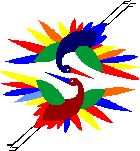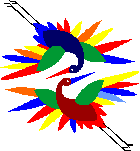
|
|

|
|
During the presentation of Ken Burns' Lewis and Clark: Journey of the
Corps of Discovery, which aired on TV12 in the fall of 1997, Sacajawea's
story was told. Sacajawea was an American Indian woman whose courage in
the face of danger was a large part of the expedition's success.
Sacajawea's fateful journey with Captain Meriwether Lewis and Captain
William Clark was the culmination of a young life filled with hardship.
She had been born into the Shoshone tribe in eastern Idaho around 1787.
As a young girl, she was captured by an enemy tribe and sold into
slavery with the Missouri River Mandans. Eventually, Sacajawea was sold
to a French-Canadian fur trader named Toussaint Charbonneau, who married
her.
That winter, Lewis and Clark's Corps of Discovery camped at Fort Mandan
in North Dakota, where Charbonneau was also spending the winter with his
pregnant wife. Charbonneau was hired as an interpreter in 1804 to
accompany the two-and-a-half-year Lewis and Clark expedition to the
Pacific Northwest, along with his wife and infant son. At the time, the
Corps' leaders were unaware that bringing Sacajawea along was the most
important decision they would make.
Sacajawea's ability as a Native translator and negotiator with
knowledge of many languages, customs and tribes was essential. She
displayed remarkable ability as a guide by leading the way to her own
country, which she had not seen since childhood. There, Sacajawea was
reunited with her brother, the head of the Shoshone tribe, who provided
the party with horses and food, without which the expedition might well
have ended almost on the spot.
When food was scarce along the trail, Sacajawea taught the men how to
gather nuts, berries and other edible plants to provide nourishment. On
one occasion, she rescued the records of the expedition from an
overturned canoe, demonstrating her dedication to the journey's success.
After the expedition's completion, Lewis and Clark named a river
"Sacajawea" in her honor. From here, her story becomes unclear. One
account states that Sacajawea died of a fever at age 25. However, native
accounts, especially Shoshone oral history, recall Sacajawea living a
full life up to age 96.
Even though the end of Sacajawea's life is uncertain, it's
unquestionable that she is an American hero. There are more monuments to
her than any other American woman. The most famous is a statue in
Washington Park in Portland, Oregon.
'sacajawea'
Woman Spirit - Sacajawea - Shoshoni
Sacajawea (Boat Launcher) or Sacagawea (Bird Woman) - Shoshoni By Julia White The Shoshoni (also Shoshone) lived in Idaho, parts of Utah and parts of Northern Nevada, and it is believed that Sacajawea was born in Eastern Idaho in what is now Salmon.
Related
Web Sites
Lewis
& Clark The
PBS companion web site to the film by Ken Burns
Lewis
& Clark Trail
sponsored by Heritage Trail, Inc.
Roster
of Lewis & Clark Expedition
List of the men who accompanied Lewis & Clark.
|
For
comments or questions |
|
Return to Native Americans Page
 |
 |
|
|
|
 |
|
 |
|
|

© Swengelsk, KB ® webmaster |
|
|
 |